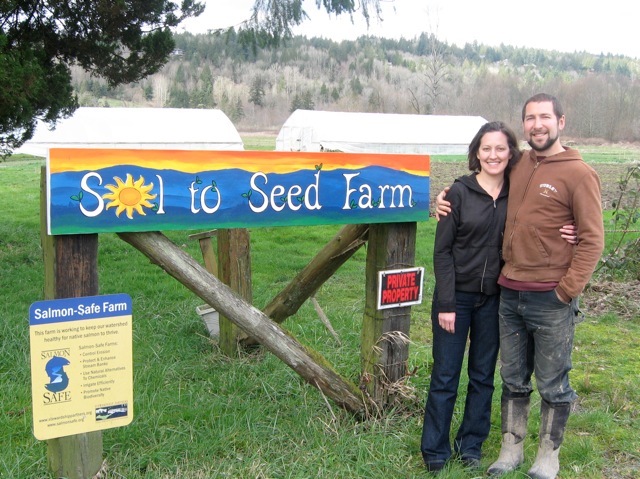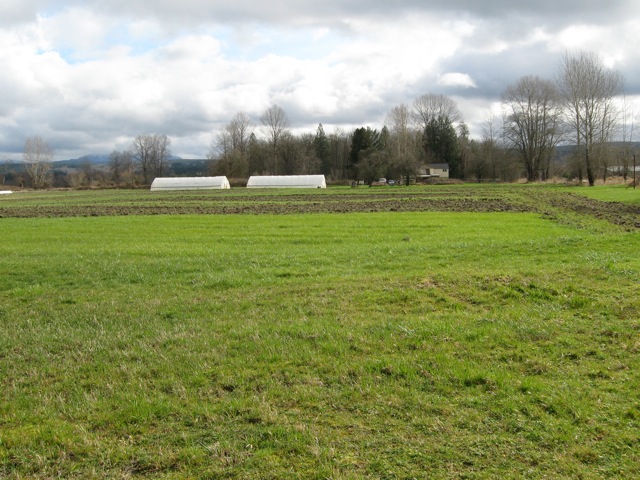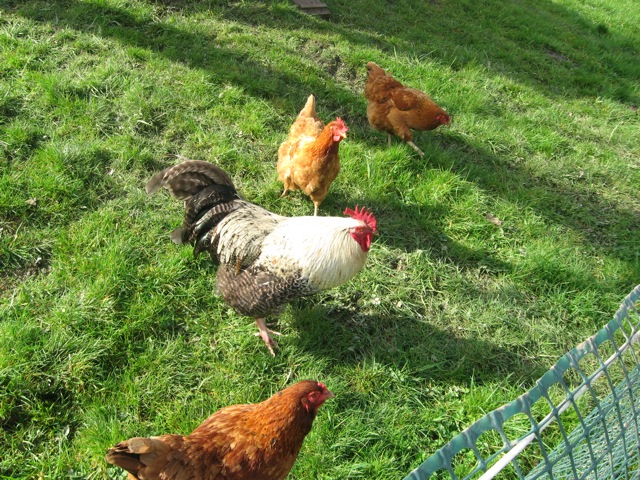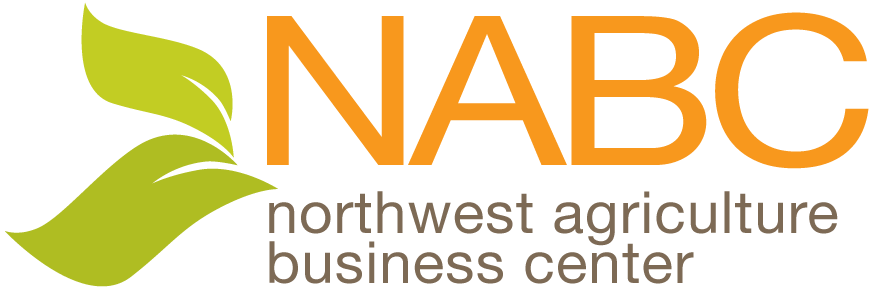Producer Member Highlight: Sol to Seed Farm
 On March 16th, PSFN Project Manager, Lucy Norris visited Sol to Seed Farm in Carnation, WA and talked with Matt and Deanna Tregoning about their CSA and wildlife in the Snoqualmie Valley.
On March 16th, PSFN Project Manager, Lucy Norris visited Sol to Seed Farm in Carnation, WA and talked with Matt and Deanna Tregoning about their CSA and wildlife in the Snoqualmie Valley.
Tell us a little bit about Sol to Seed Farm.
My wife Deanna and I moved here in 2008 so this is the third year we’ve been farming this land. We both grew up in Michigan. Farming here is a long-term commitment for us and we wanted a place where we could leave a lasting impression by conserving and allowing nature to guide us. We are Certified Naturally Grown and incorporate many growing philosophies, all of which are based on organic principles. We have twenty acres but only one and half acres in production. We use no synthetics and have a strict non-GMO pledge. Most of our farm is worked with hand tools and a walk-behind tractor. We use our 4-wheel tractor only when necessary. We have a Facebook page, we Tweet, and we put flyers up at PCC and participate in farmers markets. We joined PSFN in 2009.
Tell me more about your CSA.
Our CSA shares are our product. All of the food we place in our CSA boxes during the season is from our farm. We do not source from other growers. We’re ready to sell (50) CSA shares this year (that’s 20 more than last year). We grow a bunch of different things and people are really happy with the quality and variety. We were once CSA customers so we’re always thinking of things we liked and didn’t like.
We already have verbal commitments from more than 50 people now, but it’s not real until the checks arrive. And right now is when we’re spending the most money. Every week that someone signs up we say, “Great! There’s the money to buy more seeds.” With each share we sell, that money goes directly back into the farm.
Our prices are based on two sizes of shares. One is a half share box ($400) that feeds two people who eats most meals at home. The full box ($600) is ideal for a family who plans to use vegetables in daily meals. For smaller restaurants (approx 20 tables), we suggest starting with 1 to 3 full shares per week and developing a tasting menu based on that week’s share. This works especially well for restaurants new to developing seasonal menus and farm direct purchasing. Start with CSA shares and train your staff how to use more “fresh off the farm” ingredients and less “RTE” processed foods.
 What can new members expect from Sol to Seed CSA boxes this year?
What can new members expect from Sol to Seed CSA boxes this year?
New CSA members should expect lighter shares earlier in the season, but we make up for it once the harvest kicks in. Early share boxes might include Kale, Kohlrabi, Peas, Bunching Onions, Green Garlic, Arugula, Radishes and Turnips. Mid Season/Late Season boxes might include Lettuce, Beans, Carrots, Beets, Fennel, Rainbow Chard, Tomatoes, Hot and Sweet Peppers, Salad Mix, Potatoes, Summer Squash, Cucumbers, Melons, Eggplant and Corn
What makes Sol to Seed Farm’s CSA unique?
We’re able to grow lots of pantry staples as well as hard to find local produce that other farms in the Pacific Northwest struggle to grow. For example, we grow an impressive variety of standard and twenty varieties of sunflowers, thirty varieties of heirloom tomatoes including saucing/paste, slicing and cherry types. We also grow forty varieties of hot and sweet peppers and eggplants popular with chefs and serious home cooks. We small but we have absolute control over our own quality standards. We also bottle and sell our own brand of pickled jalapeno pepper rings.
It’s been another bad year for floods, has it affected your planting?
Not really. In 2009 it was really bad. That’s before we got the green houses. Our house is 8 feet off the ground, but if water ever got in the house that would be cataclysmic. Since we moved here the worst flood got up to about 4 feet below the house, so I think we’re OK. Our waterway in Snoqualmie is pretty clean so it’s more about dealing with the mud than with garbage. It’s not the Mississippi River although some of the rules about planting after a flood are based on one polluted river across the country.
Oh! There’s the first swallow… (Pauses to look as the bird flying away)

Those are actually bat houses. We just put those up last year so we’ll see what happens, but there’s nothing yet. I’d like to bring in some owls, too. That’s the cool thing about living here since Salmon Safe started establishing trees early with the neighbors like Jubilee Farms all the way down the road, cleaning out the non-native plants. Wendy (from Jubilee Farms) and I really enjoy following the birds and tell each other when we see something new. She said they’ve noticed more raptors since the trees have been established. We’re just trying to attract everything we can. Birds in general seem to really thrive out here. It’s amazing in the summer, all day we’ll see hawks, falcons, kestrels, bald eagles, harriers—at least once a day you see a hawk come down and snatch up a snake or rats and carry it away. I saw a hummingbird today and so I raced out to check the bird feeders. We are also trying to attract Mason bees. We’ve got really good soil out here but a thriving bird and insect population will only make it better.
Connecting with Sol to Seed Farm
Sol to Seed Farm is now accepting applications for their 2011 CSA season. This year they plan to increase the number of CSA shares, so make sure you get your applications and payments in soon to guarantee your spot. The first share is planned for distribution on June 15th through October. In addition to our existing drop points or ‘depots’ in Issaquah Klahanie, Downtown Seattle, Bellevue Bridal Trails and at the farm in Carnation, Sol to Seed is adding one new Seattle depot, in the Maple Leaf neighborhood. Please email Matt with questions regarding the upcoming season: soltoseedfarm@gmail.com. Matt is open to adding new depot locations. Those interested in offering their commercial or residential site as a pick-up location Sol to Seed Farm is offering a 5% discount for a depot site that serves at least 4 CSA members.
For more information about Sol to Seed Farm, and to sign up for their 2011 CSA, contact Matt and Deanna Tregoning at soltoseedfarm@gmail.com or 425-273-1232. You can also visit their website at www.soltoseedfarm.com, follow them on Facebook http://www.facebook.com/pages/Sol-to-Seed-Farm/222101135476 and on Twitter: soltoseedfarm.
Producer Member Highlight: Sol to Seed Farm
On March 16th, PSFN Project Manager, Lucy Norris visited Sol to Seed Farm in Carnation, WA and talked with Matt and Deanna Tregoning about their CSA and wildlife in the Snoqualmie Valley.
Tell me a little bit about Sol to Seed Farm
My wife Deanna and I moved here in 2008 so this is the third year we’ve been farming this land. We both grew up in Michigan. Farming here is a long-term commitment for us and we wanted a place where we could leave a lasting impression by conserving and allowing nature to guide us. We are Certified Naturally Grown and incorporate many growing philosophies, all of which are based on organic principles. We have twenty acres but only one and half acres in production. We use no synthetics and have a strict non-GMO pledge. Most of our farm is worked with hand tools and a walk-behind tractor. We use our 4-wheel tractor only when necessary. We have a Facebook page, we Tweet, and we put flyers up at PCC and participate in farmers markets. We joined PSFN in 2009.
Tell me more about your CSA
Our CSA shares are our product. All of the food we place in our CSA boxes during the season is from our farm. We do not source from other growers. We’re ready to sell (50) CSA shares this year (that’s 20 more than last year). We grow a bunch of different things and people are really happy with the quality and variety. We were once CSA customers so we’re always thinking of things we liked and didn’t like.
We already have verbal commitments from more than 50 people now, but it’s not real until the checks arrive. And right now is when we’re spending the most money. Every week that someone signs up we say, “Great! There’s the money to buy more seeds.” With each share we sell, that money goes directly back into the farm.
Our prices are based on two sizes of shares. One is a half share box ($400) that feeds two people who eats most meals at home. The full box ($600) is ideal for a family who plans to use vegetables in daily meals. For smaller restaurants (approx 20 tables), we suggest starting with 1 to 3 full shares per week and developing a tasting menu based on that week’s share. This works especially well for restaurants new to developing seasonal menus and farm direct purchasing. Start with CSA shares and train your staff how to use more “fresh off the farm” ingredients and less “RTE” processed foods.
What can new members expect from Sol to Seed CSA boxes this year?
New CSA members should expect lighter shares earlier in the season, but we make up for it once the harvest kicks in. Early share boxes might include Kale, Kohlrabi, Peas, Bunching Onions, Green Garlic, Arugula, Radishes and Turnips. Mid Season/Late Season boxes might include Lettuce, Beans, Carrots, Beets, Fennel, Rainbow Chard, Tomatoes, Hot and Sweet Peppers, Salad Mix, Potatoes, Summer Squash, Cucumbers, Melons, Eggplant and Corn
What makes Sol to Seed Farm’s CSA unique?
We’re able to grow lots of pantry staples as well as hard to find local produce that other farms in the Pacific Northwest struggle to grow. For example, we grow an impressive variety of standard and twenty varieties of sunflowers, thirty varieties of heirloom tomatoes including saucing/paste, slicing and cherry types. We also grow forty varieties of hot and sweet peppers and eggplants popular with chefs and serious home cooks. We small but we have absolute control over our own quality standards. We also bottle and sell our own brand of pickled jalapeno pepper rings.
It’s been another bad year for floods, has it affected your planting?
Not really. In 2009 it was really bad. That’s before we got the green houses. Our house is 8 feet off the ground, but if water ever got in the house that would be cataclysmic. Since we moved here the worst flood got up to about 4 feet below the house, so I think we’re OK. Our waterway in Snoqualmie is pretty clean so it’s more about dealing with the mud than with garbage. It’s not the Mississippi River although some of the rules about planting after a flood are based on one polluted river across the country.
Oh! There’s the first swallow… (Pauses to look as the bird flying away)
So what kinds of birds are you trying to attract over here?
Those are actually bat houses. We just put those up last year so we’ll see what happens, but there’s nothing yet. I’d like to bring in some owls, too. That’s the cool thing about living here since Salmon Safe started establishing trees early with the neighbors like Jubilee Farms all the way down the road, cleaning out the non-native plants. Wendy (from Jubilee Farms) and I really enjoy following the birds and tell each other when we see something new. She said they’ve noticed more raptors since the trees have been established. We’re just trying to attract everything we can. Birds in general seem to really thrive out here. It’s amazing in the summer, all day we’ll see hawks, falcons, kestrels, bald eagles, harriers—at least once a day you see a hawk come down and snatch up a snake or rats and carry it away. I saw a hummingbird today and so I raced out to check the bird feeders. We are also trying to attract Mason bees. We’ve got really good soil out here but a thriving bird and insect population will only make it better.
Connecting with Sol to Seed Farm
Sol to Seed Farm is now accepting applications for their 2011 CSA season. This year they plan to increase the number of CSA shares, so make sure you get your applications and payments in soon to guarantee your spot. The first share is planned for distribution on June 15th through October. In addition to our existing drop points or ‘depots’ in Issaquah Klahanie, Downtown Seattle, Bellevue Bridal Trails and at the farm in Carnation, Sol to Seed is adding one new Seattle depot, in the
Producer Member Highlight: Sol to Seed Farm
On March 16th, PSFN Project Manager, Lucy Norris visited Sol to Seed Farm in Carnation, WA and talked with Matt and Deanna Tregoning about their CSA and wildlife in the Snoqualmie Valley.
Tell me a little bit about Sol to Seed Farm
My wife Deanna and I moved here in 2008 so this is the third year we’ve been farming this land. We both grew up in Michigan. Farming here is a long-term commitment for us and we wanted a place where we could leave a lasting impression by conserving and allowing nature to guide us. We are Certified Naturally Grown and incorporate many growing philosophies, all of which are based on organic principles. We have twenty acres but only one and half acres in production. We use no synthetics and have a strict non-GMO pledge. Most of our farm is worked with hand tools and a walk-behind tractor. We use our 4-wheel tractor only when necessary. We have a Facebook page, we Tweet, and we put flyers up at PCC and participate in farmers markets. We joined PSFN in 2009.
Tell me more about your CSA
Our CSA shares are our product. All of the food we place in our CSA boxes during the season is from our farm. We do not source from other growers. We’re ready to sell (50) CSA shares this year (that’s 20 more than last year). We grow a bunch of different things and people are really happy with the quality and variety. We were once CSA customers so we’re always thinking of things we liked and didn’t like.
We already have verbal commitments from more than 50 people now, but it’s not real until the checks arrive. And right now is when we’re spending the most money. Every week that someone signs up we say, “Great! There’s the money to buy more seeds.” With each share we sell, that money goes directly back into the farm.
Our prices are based on two sizes of shares. One is a half share box ($400) that feeds two people who eats most meals at home. The full box ($600) is ideal for a family who plans to use vegetables in daily meals. For smaller restaurants (approx 20 tables), we suggest starting with 1 to 3 full shares per week and developing a tasting menu based on that week’s share. This works especially well for restaurants new to developing seasonal menus and farm direct purchasing. Start with CSA shares and train your staff how to use more “fresh off the farm” ingredients and less “RTE” processed foods.
What can new members expect from Sol to Seed CSA boxes this year?
New CSA members should expect lighter shares earlier in the season, but we make up for it once the harvest kicks in. Early share boxes might include Kale, Kohlrabi, Peas, Bunching Onions, Green Garlic, Arugula, Radishes and Turnips. Mid Season/Late Season boxes might include Lettuce, Beans, Carrots, Beets, Fennel, Rainbow Chard, Tomatoes, Hot and Sweet Peppers, Salad Mix, Potatoes, Summer Squash, Cucumbers, Melons, Eggplant and Corn
What makes Sol to Seed Farm’s CSA unique?
We’re able to grow lots of pantry staples as well as hard to find local produce that other farms in the Pacific Northwest struggle to grow. For example, we grow an impressive variety of standard and twenty varieties of sunflowers, thirty varieties of heirloom tomatoes including saucing/paste, slicing and cherry types. We also grow forty varieties of hot and sweet peppers and eggplants popular with chefs and serious home cooks. We small but we have absolute control over our own quality standards. We also bottle and sell our own brand of pickled jalapeno pepper rings.
It’s been another bad year for floods, has it affected your planting?
Not really. In 2009 it was really bad. That’s before we got the green houses. Our house is 8 feet off the ground, but if water ever got in the house that would be cataclysmic. Since we moved here the worst flood got up to about 4 feet below the house, so I think we’re OK. Our waterway in Snoqualmie is pretty clean so it’s more about dealing with the mud than with garbage. It’s not the Mississippi River although some of the rules about planting after a flood are based on one polluted river across the country.
Oh! There’s the first swallow… (Pauses to look as the bird flying away)
So what kinds of birds are you trying to attract over here?
Those are actually bat houses. We just put those up last year so we’ll see what happens, but there’s nothing yet. I’d like to bring in some owls, too. That’s the cool thing about living here since Salmon Safe started establishing trees early with the neighbors like Jubilee Farms all the way down the road, cleaning out the non-native plants. Wendy (from Jubilee Farms) and I really enjoy following the birds and tell each other when we see something new. She said they’ve noticed more raptors since the trees have been established. We’re just trying to attract everything we can. Birds in general seem to really thrive out here. It’s amazing in the summer, all day we’ll see hawks, falcons, kestrels, bald eagles, harriers—at least once a day you see a hawk come down and snatch up a snake or rats and carry it away. I saw a hummingbird today and so I raced out to check the bird feeders. We are also trying to attract Mason bees. We’ve got really good soil out here but a thriving bird and insect population will only make it better.
Connecting with Sol to Seed Farm
Sol to Seed Farm is now accepting applications for their 2011 CSA season. This year they plan to increase the number of CSA shares, so make sure you get your applications and payments in soon to guarantee your spot. The first share is planned for distribution on June 15th through October. In addition to our existing drop points or ‘depots’ in Issaquah Klahanie, Downtown Seattle, Bellevue Bridal Trails and at the farm in Carnation, Sol to Seed is adding one new Seattle depot, in the Maple Leaf neighborhood. Please email Matt with questions regarding the upcoming season: soltoseedfarm@gmail.com. Matt is open to adding new depot locations. Those interested in offering their commercial or residential site as a pick-up location Sol to Seed Farm is offering a 5% discount for a depot site that serves at least 4 CSA members.
For more information about Sol to Seed Farm, and to sign up for their 2011 CSA, contact Matt and Deanna Tregoning at soltoseedfarm@gmail.com or 425-273-1232. You can also visit their website at www.soltoseedfarm.com, follow them on Facebook http://www.facebook.com/pages/Sol-to-Seed-Farm/222101135476 and on Twitter: soltoseedfarm.
Maple Leaf neighborhood. Please email Matt with questions regarding the upcoming season: soltoseedfarm@gmail.com. Matt is open to adding new depot locations. Those interested in offering their commercial or residential site as a pick-up location Sol to Seed Farm is offering a 5% discount for a depot site that serves at least 4 CSA members.
For more information about Sol to Seed Farm, and to sign up for their 2011 CSA, contact Matt and Deanna Tregoning at soltoseedfarm@gmail.com or 425-273-1232. You can also visit their website at www.soltoseedfarm.com, follow them on Facebook http://www.facebook.com/pages/Sol-to-Seed-Farm/222101135476 and on Twitter: soltoseedfarm.
